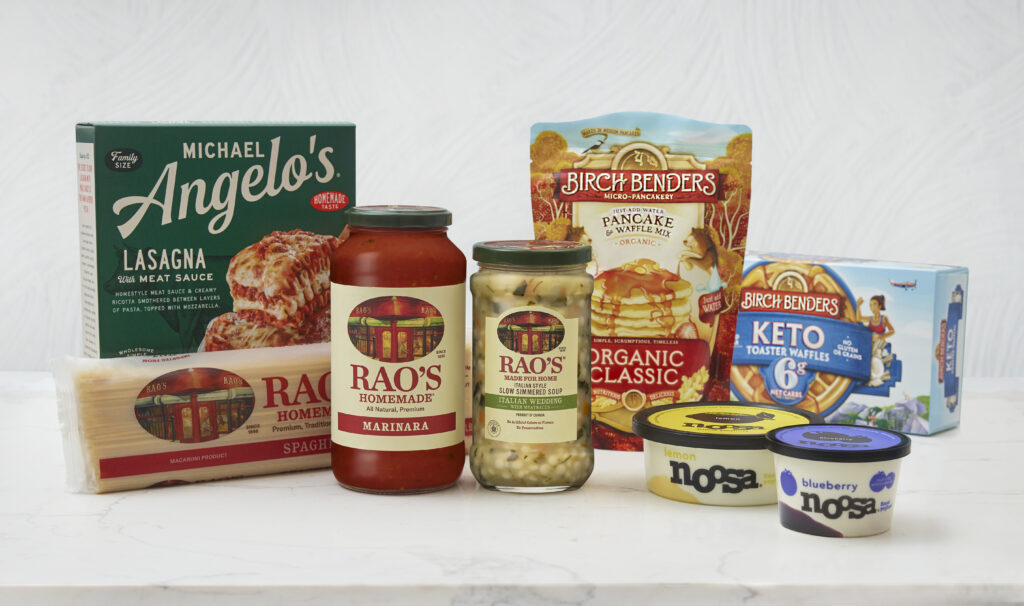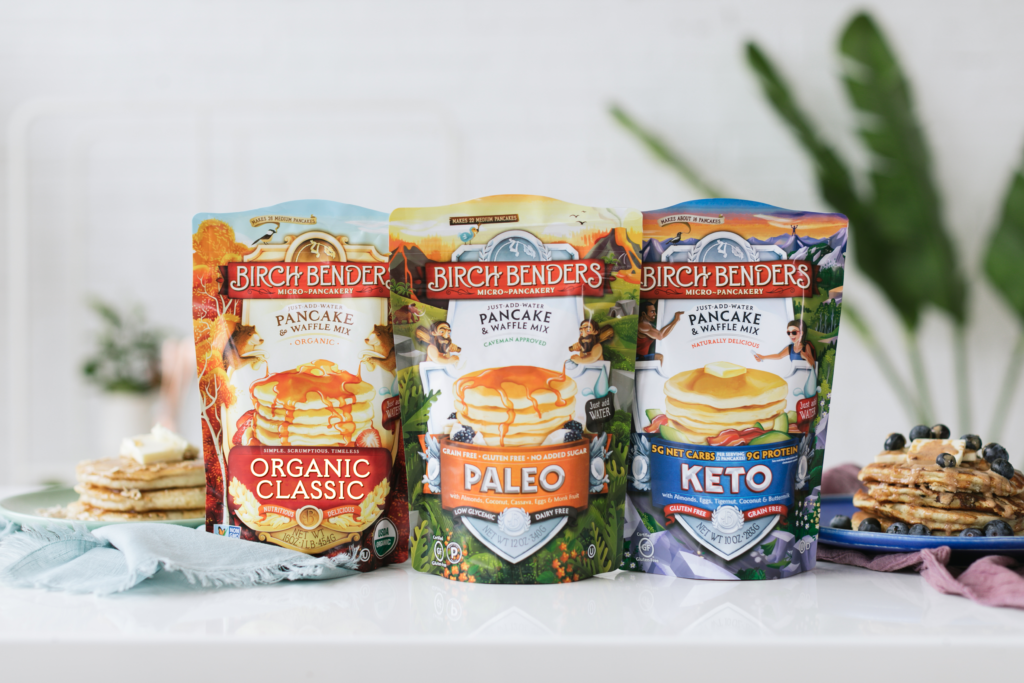
- Sovos Brands sells high-quality food products through its premium brands
- $800 million in retail sales in 2020, double digit growth since 2017
- Net sales growth of over 40% in 2020, projecting double digits in 2021, exceeding category averages
- Comps include Vital Farms, Inc., The Simply Good Foods Company, The Hain Celestial Group, Inc., Beyond Meat, Inc., McCormick & Company, General Mills, Inc.
- Customer overlap enables powerful distribution synergies
- Board members include Bill Johnson (Former Chairman/CEO of Heinz) and Carol Tome (CEO of United Parcel Service, Inc.)
- Backed by Boston-based private equity firm Advent International
- Possible M&A or IPO on the horizon
Eating at home is here to stay. And Sovos Brands, parent company of Rao’s Homemade pasta sauce, Noosa yoghurt, Michael Angelo’s frozen entrees and Birch Benders pancake and waffle mix, is betting that quality ingredients will win with consumers every time. Investors should be on the lookout for a seat at the table.
Sovos, with over $800 million in retail sales, is on a mission to build and grow unique food brands. The company is driving organic growth through investments in marketing, sales and innovation. And its premium labels are positioned to continue to take advantage of consumer demands for restaurant quality at-home food experiences.
The company’s products are carried in Walmart Inc., Target Corporation, Amazon.com, Inc., The Kroger Co., and Safeway grocery stores. Sovos has grown its topline and bottom line by double digits in each year since 2017. It posted net sales growth of over 40% in 2020 and is projecting double-digit growth in 2021, exceeding category averages. And with the recent addition of Birch Benders to the portfolio, it has bolstered its presence in the breakfast and snacking segments and is boosting distribution synergies.
The packaged-food industry could benefit in 2021 from permanent consumer behavioral shifts that favor at-home meals and a reliance on e-commerce. A strong 2020 laid the foundation for investments in marketing, innovation and supply-chain flexibility. Food consumption at home may persist until widespread vaccine adoption unlocks confidence in returning to restaurants, business locations and schools. Even then, many consumers are likely to embrace their newfound love for top-notch foods in their own kitchens.
Consumer uptake in online orders should favor packaged-food companies that have invested with retail partners in digital strategies. Sovos has been paying more attention to consumer online shopping behavior and how to take advantage of opportunities in ship-to-home, home-delivery, click-and-collect, on-demand delivery and direct-to-consumer sales. Understanding purchase history is key, as it helps drive repurchases, benefitting retail partners and food manufacturers.
About 90% of the biggest food brand names in the U.S. have seen their market share decline as consumers try more specialized labels, often all-natural products or ones with minimal numbers of ingredients and for which they are willing to pay more.

Rao’s Homemade was acquired in 2017 and is one of the most successful consumer packaged goods stories of recent years. It had the fastest-growing center store food brands from 2018-2020, growing at an annualized 45%. Rao’s is now the third largest brand in its category, and by launching into dry pasta and soup, it is now the fifth-largest in the soup category. The company expects it to be a $1 billion brand by 2025.
Austin-based Michael Angelo’s was acquired in 2017 and is a premium brand in Italian frozen food, the largest segment in the frozen category. It had top-line growth of 10% in 2020, with food channel consumption above 20%. Restaurant quality food at home is an important trend where Michael Angelo’s plays well with premium family-size authentic frozen meals.
Denver-based Noosa yoghurt was acquired in 2018. Sovos returned the brand to growth in a declining category. It’s now one of top growth brands in the category – the fastest growing in unit sales for brands over $150 million, and among the top five brands in revenue growth. Although household penetration is low at 7% versus 35% for other major yogurt brands, it has the highest net promoter scores (NPS) in the category. The combination of low household penetration, high NPS, increased innovation and marketing gives Noosa the potential to double in size over the next five years
Birch Benders, also based in Denver, appeals to people seeking quality foods without a lot of additives and preservatives and which have an imaginative brand that customers are ready to embrace. Birch Benders was acquired in 2020 and like Rao’s, is a high-growth insurgent brand, mirroring Rao’s profile in nearly every way: unique high-quality position in a sleepy category, consumer affinity, low awareness and household penetration.

Birch Benders is already the fastest growing pancake and waffle mix brand. It is the fastest growing frozen waffle brand in multi-channel, and has only 2% household penetration and 3% guided awareness but high NPS scores – indicating huge growth potential with marketing and distribution support. Matt LaCasse and Lizzi Ackerman, the husband-and-wife founding team behind Birch Benders, will stay with the company under a five-year consulting arrangement.
Innovation and product differentiation will be essential to sustained organic sales growth for packaged-food companies in 2021, beyond any lingering push from Covid-19. Sovos’ is doubling down by increasing brand support via increased advertising budgets as the worst of the coronavirus crisis passes.
Many packaged-food competitors could emerge from the coronavirus pandemic with leaner portfolios. While many, including Vital farms, Simply Good, Hain, Beyond Meat, McCormick and General Mills have optimized their brand portfolios in the past few years, the pandemic has been a litmus test to help all companies in the industry reevaluate the variety of products offered, including sizing.
Standardizing package size helps improve supply-chain efficiency and reduce costs. Shifts in production facilities to produce the fastest-moving items have also created an opportunity to rethink which products to bring back when demand trends return to normal.
Sovos employs 600 people nationwide across its food brands including locations in Berkeley, Denver and Austin—all of which have led to significant synergies. It has added a shared services office in Louisville that’s hiring accountants and human resources workers to handle back-office functions for Sovos portfolio companies.
Further upside to consider: M&A involving healthy snacking, plant-based alternative foods and sustainability or mission-focused products may accelerate as consumer adoption of these offerings matures. An uptick in technology or data-related deals may also occur, as large packaged-food companies seek to expand e-commerce capabilities and become less reliant on third-party data.
Packaged-food companies have been using strong cash generation during the pandemic to cut leverage, with tie-ups remaining small but more frequent as companies strategically manage portfolios.
Investors know there are no easy answers when it comes to picking companies, but this is as clear cut as it gets. Food for thought.
IPO Edge Contact:
Jarrett Banks, Editor-at-Large
Twitter: @ipoedge







